| Listing 1 - 10 of 11 | << page >> |
Sort by
|
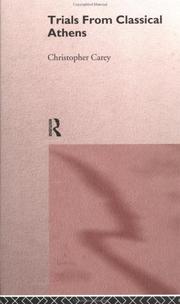
ISBN: 041510761X 0415107601 9780415107617 9780415107600 Year: 1997 Publisher: London Routledge
Abstract | Keywords | Export | Availability | Bookmark
 Loading...
Loading...Choose an application
- Reference Manager
- EndNote
- RefWorks (Direct export to RefWorks)
Arguments [Legal ] --- Forensic orations --- Legal arguments --- Plaidoyers --- Pleidooien --- Law, Greek --- Trials --- Droit grec --- Procès --- Débats judiciaires --- History --- Histoire --- Forensic orations. --- Procès --- Débats judiciaires --- Arguments, Legal --- Oral pleading --- Speeches, addresses, etc. --- Trial practice --- Forensic oratory --- State trials --- Procedure (Law) --- Greece --- Athens (Greece) --- Court proceedings --- History. --- Trials - Greece - Athens.
Book
ISBN: 9782802727613 2802727613 Year: 2009 Publisher: Bruxelles Bruylant
Abstract | Keywords | Export | Availability | Bookmark
 Loading...
Loading...Choose an application
- Reference Manager
- EndNote
- RefWorks (Direct export to RefWorks)
Law of civil procedure --- Sociology of law --- Legal theory and methods. Philosophy of law --- Arguments [Legal ] --- Eloquence judiciaire --- Forensic orations --- Forensic oratory --- Gerechtelijke welsprekendheid --- Harangues judiciaires --- Legal arguments --- Plaidoyers --- Pleidooien --- Éloquence du barreau --- Lawyers --- Procedure (Law) --- Pleading --- Avocats --- Procédure (Droit) --- Plaidoirie --- Law --- Philosophy --- Philosophy. --- Procédure (Droit) --- Jurisprudence --- Law - Philosophy --- Belgique --- Procédure (droit) --- Rhétorique --- Dialectique --- Éloquence judiciaire
Book
ISBN: 3495473874 9783495473870 Year: 1981 Publisher: Freiburg Alber
Abstract | Keywords | Export | Availability | Bookmark
 Loading...
Loading...Choose an application
- Reference Manager
- EndNote
- RefWorks (Direct export to RefWorks)
Forensic orations --- Law --- -Rhetoric --- Language and languages --- Speaking --- Authorship --- Expression --- Style, Literary --- Acts, Legislative --- Enactments, Legislative --- Laws (Statutes) --- Legislative acts --- Legislative enactments --- Jurisprudence --- Legislation --- Arguments, Legal --- Legal arguments --- Oral pleading --- Speeches, addresses, etc. --- Trial practice --- Forensic oratory --- Language --- Rhetoric --- Literary style --- Legal reasoning --- Language, Legal --- Legal language --- Legal style --- Style, Legal --- Bill drafting --- Methodology --- Rhetoric. --- Forensic orations. --- Language. --- Methodology. --- Law - Methodology
Book
ISSN: 15724395 ISBN: 9783319161488 3319161474 9783319161471 3319161482 Year: 2015 Volume: 112 Publisher: Cham : Springer International Publishing : Imprint: Springer,
Abstract | Keywords | Export | Availability | Bookmark
 Loading...
Loading...Choose an application
- Reference Manager
- EndNote
- RefWorks (Direct export to RefWorks)
This book provides theoretical tools for evaluating the soundness of arguments in the context of legal argumentation. It deals with a number of general argument types and their particular use in legal argumentation. It provides detailed analyses of argument from authority, argument ad hominem, argument from ignorance, slippery slope argument and other general argument types. Each of these argument types can be used to construct arguments that are sound as well as arguments that are unsound. To evaluate an argument correctly one must be able to distinguish the sound instances of a certain argument type from its unsound instances. This book promotes the development of theoretical tools for this task.
Law. --- Theories of Law, Philosophy of Law, Legal History. --- Philosophy of Law. --- Philosophy of law. --- Droit --- Law --- Philosophy of law --- Law, Politics & Government --- Philosophy & Religion --- Law, General & Comparative --- Philosophy --- Forensic orations. --- Semantics (Law) --- Methodology. --- Legal reasoning --- Arguments, Legal --- Legal arguments --- Political science. --- Philosophy. --- Oral pleading --- Speeches, addresses, etc. --- Trial practice --- Forensic oratory --- Law—Philosophy. --- Administration --- Civil government --- Commonwealth, The --- Government --- Political theory --- Political thought --- Politics --- Science, Political --- Social sciences --- State, The --- Acts, Legislative --- Enactments, Legislative --- Laws (Statutes) --- Legislative acts --- Legislative enactments --- Jurisprudence --- Legislation
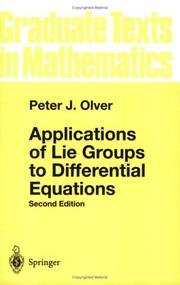
ISBN: 0387950001 0387940073 3540940073 9780387940076 Year: 1993 Volume: 107 Publisher: New York Springer-Verlag
Abstract | Keywords | Export | Availability | Bookmark
 Loading...
Loading...Choose an application
- Reference Manager
- EndNote
- RefWorks (Direct export to RefWorks)
Symmetry methods have long been recognized to be of great importance for the study of the differential equations. This book provides a solid introduction to those applications of Lie groups to differential equations which have proved to be useful in practice. The computational methods are presented so that graduate students and researchers can readily learn to use them. Following an exposition of the applications, the book develops the underlying theory. Many of the topics are presented in a novel way, with an emphasis on explicit examples and computations. Further examples, as well as new theoretical developments, appear in the exercises at the end of each chapter.
Differential equations. --- Lie groups. --- Équations différentielles. --- Lie, Groupes de. --- 512.81 --- Symmetric spaces --- 512.81 Lie groups --- Differential equations --- Lie groups --- #WSCH:AAS2 --- Groups, Lie --- Lie algebras --- Topological groups --- 517.91 Differential equations --- 517.91. --- Numerical solutions --- Equations différentielles --- Groupes de Lie --- 517.929 --- 517.929 Differential difference equations (with retarded arguments etc.) --- Differential difference equations (with retarded arguments etc.) --- Équations différentielles
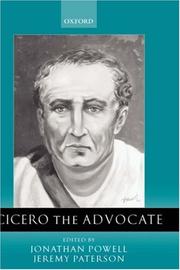
ISBN: 0198152809 019171514X 0199298297 9786610753840 0191541516 1280753846 142376773X 9780199298297 Year: 2006 Publisher: Oxford [etc.] : Oxford University Press,
Abstract | Keywords | Export | Availability | Bookmark
 Loading...
Loading...Choose an application
- Reference Manager
- EndNote
- RefWorks (Direct export to RefWorks)
This is the first book in English to take Cicero's forensic speeches seriously as acts of advocacy, i.e. as designed to ensure that the person he represents is acquitted or that the person he is prosecuting is found guilty. It seeks to set the speeches within the context of the court system of the Late Roman Republic and to explore in detail the strategies available to Roman advocates to win the votes of jurors. The volume comprises a substantial introduction, fourteen chapters by prominent Ciceronian scholars in Britain, North America, and Germany, and a final chapter by a current British Appeal Court judge who comments on Cicero's techniques from the point of view of a modern advocate. The introduction deals with issues concerning the general nature of advocacy, the Roman court system as compared with other ancient and modern systems, the Roman "profession" of advocacy and its etiquette, the place of advocacy in Cicero's career, the ancient theory of rhetoric and argument as applied to courtroom advocacy, and the relationship between the published texts of the speeches as we have them and the speeches actually delivered in court. The first eight chapters discuss general themes: legal procedure in Cicero's time, Cicero's Italian clients, Cicero's methods of setting out or alluding to the facts of a case, his use of legal arguments, arguments from character, invective, self-reference, and emotional appeal, the last of these especially in the concluding sections of his speeches. Chapters 9-14 examine a range of particular speeches as case studies--In Verrem II.1 (from Cicero's only major extant prosecution case), Pro Archia, De Domo Sua, Pro Caecina, Pro Cluentio, Pro Ligario. These speeches cover the period of the height of Cicero's career, from 70 BC, when Cicero became acknowledged as the leading Roman advocate, to 49 BC when Caesar's dictatorship required Cicero to adapt his well-tried forensic techniques to drastically new circumstances, and they contain argu
Practice of law (Roman law) --- Forensic orations --- Droit --- Débats judiciaires --- History --- Pratique (Droit romain) --- Histoire --- Cicero, Marcus Tullius --- Arguments [Legal ] --- Exercice du droit romain --- Legal arguments --- Plaidoyers --- Pleidooien --- Practice of law [Roman law] --- Rechtsgeleerde praktijk [Romeinse] --- Practice of law (Roman law). --- Lawyers (Roman law) --- Roman law --- Arguments, Legal --- Oral pleading --- Speeches, addresses, etc. --- Trial practice --- Forensic oratory --- Cicero, Marcus Tullius. --- Cicero --- Cicerone, M. T. --- Cicéron, Marcus --- M. Tulli Ciceronis --- T︠S︡it︠s︡eron, Mark Tulliĭ --- Cyceron --- Cicéron --- Kikerōn --- Cicerón, M. Tulio --- Ḳiḳero --- Cicerone --- Cicerón, Marco Tulio --- Ḳiḳero, Marḳus Ṭulyus --- Tullius Cicero, Marcus --- Kikerōn, M. T. --- Cicerone, M. Tullio --- Cicero, M. T. --- Cyceron, Marek Tulliusz --- ציצרון, מארקוס טולליוס --- קיקרו, מארקוס טוליוס --- קיקרו, מרקוס טוליוס --- キケロ --- 西塞罗 --- Lawyers --- Avocats --- Forensic orations - Rome. --- Rhetoric, Ancient.
Book
ISBN: 3428046404 9783428046409 Year: 1979 Volume: 1 Publisher: Berlin Duncker und Humblot
Abstract | Keywords | Export | Availability | Bookmark
 Loading...
Loading...Choose an application
- Reference Manager
- EndNote
- RefWorks (Direct export to RefWorks)
Legal theory and methods. Philosophy of law --- Forensic orations --- Jurisprudence --- Law --- Congresses --- Language --- Interpretation and construction --- -Jurisprudence --- -Law --- -340.132 <430.1> --- Acts, Legislative --- Enactments, Legislative --- Laws (Statutes) --- Legislative acts --- Legislative enactments --- Legislation --- Arguments, Legal --- Legal arguments --- Oral pleading --- Speeches, addresses, etc. --- Trial practice --- Forensic oratory --- -Congresses --- Toepassing van de wet.--Westduitsland. Bondsrepubliek Duitsland --- Philosophy --- 340.132 <430.1> Toepassing van de wet.--Westduitsland. Bondsrepubliek Duitsland --- 340.132 <430.1> --- Interpretation and construction&delete& --- Language&delete& --- Forensic orations - Congresses --- Jurisprudence - Congresses --- Law - Language - Congresses --- Law - Interpretation and construction - Congresses
Book
ISBN: 9789004258570 9789004260184 9004260188 9004258574 1299847617 Year: 2013 Volume: 364 Publisher: Leiden Boston
Abstract | Keywords | Export | Availability | Bookmark
 Loading...
Loading...Choose an application
- Reference Manager
- EndNote
- RefWorks (Direct export to RefWorks)
In A Commentary on Selected Speeches of Isaios , Brenda Griffith-Williams offers a fresh insight, accessible to non-Greek readers, into four disputed inheritance cases from the Athenian courts in the 4th century B.C. The only comprehensive English language commentary on Isaios (Wyse, 1904) reflects a negative view of the Athenian legal system as one in which the judges, who had no legal training, could be easily outwitted by an unscrupulous speechwriter with no regard for the truth. By addressing the complex interplay of factual, legal, and rhetorical issues in the selected speeches, Brenda Griffith-Williams identifies the strengths and weaknesses of each speaker's case and presents a more balanced assessment of Isaios's work.
Inheritance and succession (Greek law) --- Forensic orations --- Speeches, addresses, etc., Greek --- Successions et héritages (Droit grec) --- Débats judiciaires --- Discours grecs --- Isaeus, --- Inheritance and succession --- History --- Translations into English --- Successions et héritages (Droit grec) --- Débats judiciaires --- Bequests --- Descent and distribution --- Descents --- Hereditary succession --- Intestacy --- Intestate succession --- Law of succession --- Succession, Intestate --- Real property --- Universal succession --- Trusts and trustees --- Law, Greek --- Arguments, Legal --- Legal arguments --- Oral pleading --- Speeches, addresses, etc. --- Trial practice --- Forensic oratory --- Law and legislation --- Isaios, --- Isajos, --- Isej, --- Iseo, --- Iseu, --- Inheritance and succession - Greece - Athens - History - To 1500 --- Forensic orations - Greece - Athens - History - To 1500 --- Speeches, addresses, etc., Greek - Translations into English --- Isaeus, - approximately 420 B.C.-approximately 350 B.C. - Translations into English --- Isaeus, - approximately 420 B.C.-approximately 350 B.C.
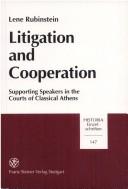
ISBN: 351507757X 9783515077576 Year: 2000 Volume: 147 Publisher: Stuttgart Steiner
Abstract | Keywords | Export | Availability | Bookmark
 Loading...
Loading...Choose an application
- Reference Manager
- EndNote
- RefWorks (Direct export to RefWorks)
Witnesses (Greek law) --- Forensic orations --- Law, Greek --- Law --- Témoins (Droit grec) --- Débats judiciaires --- Droit grec --- Droit --- History --- Histoire --- Athens (Greece) --- Athènes (Grèce) --- Trials, litigation, etc. --- Procès, litiges, etc --- Law, Greek. --- Temoins (Droit grec) --- Debats judiciaires --- Droit grec. --- Histoire. --- -Law --- -Law, Greek --- Greek law --- Law, Ancient --- Acts, Legislative --- Enactments, Legislative --- Laws (Statutes) --- Legislative acts --- Legislative enactments --- Jurisprudence --- Legislation --- Arguments, Legal --- Legal arguments --- Oral pleading --- Speeches, addresses, etc. --- Trial practice --- Forensic oratory --- -History --- -Athens (Greece) --- -Trials, litigation, etc --- Procès, instances, etc. --- Witnesses (Greek law). --- Témoins (Droit grec). --- Témoins (Droit grec) --- Débats judiciaires --- Athènes (Grèce) --- Procès, litiges, etc --- Aḟiny (Greece) --- Atene (Greece) --- Atʻēnkʻ (Greece) --- Ateny (Greece) --- Athen (Greece) --- Athēna (Greece) --- Athēnai (Greece) --- Athènes (Greece) --- Athinai (Greece) --- Athīnā (Greece) --- Αθήνα (Greece) --- Forensic orations - Greece - Athens - History - To 1500. --- Law - Greece - Athens - History - To 1500. --- Debats judiciaires - Grece - Athene. --- Droit - Grece - Athene - Histoire. --- Athenes (grece) --- Histoire ancienne
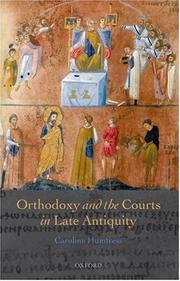
ISBN: 9780198208419 0198208413 0191716960 128114715X 9786611147150 019151876X 1435620585 Year: 2007 Publisher: Oxford Oxford University Press
Abstract | Keywords | Export | Availability | Bookmark
 Loading...
Loading...Choose an application
- Reference Manager
- EndNote
- RefWorks (Direct export to RefWorks)
Roman law --- Practice of law (Roman law) --- Courts --- Forensic orations. --- Rhetoric, Ancient. --- Church history --- Droit romain --- Droit --- Tribunaux --- Débats judiciaires --- Rhétorique ancienne --- Eglise --- Language. --- Langage --- Pratique (Droit romain) --- Histoire --- Forensic orations --- Rhetoric, Ancient --- --Rome ancienne --- --Tribunal --- --Rhétorique antique --- --Histoire de l'Église --- --Église primitive --- --Hérésie --- --Language --- -Practice of law (Roman law) --- -Forensic orations. --- -348.15*1 --- Christianity --- Ecclesiastical history --- History, Church --- History, Ecclesiastical --- History --- Classical languages --- Greek language --- Greek rhetoric --- Latin language --- Latin rhetoric --- Arguments, Legal --- Legal arguments --- Oral pleading --- Speeches, addresses, etc. --- Trial practice --- Forensic oratory --- Judiciary --- Dispute resolution (Law) --- Judicial districts --- Law --- Procedure (Law) --- Judicial power --- Jurisdiction --- Justice, Administration of --- Lawyers (Roman law) --- Civil law --- Civil law (Roman law) --- Law, Roman --- Kerkelijk recht: collecties 4e-9e eeuw --- Rhetoric --- Law and legislation --- 348.15*1 Kerkelijk recht: collecties 4e-9e eeuw --- Débats judiciaires --- Rhétorique ancienne --- Ancient rhetoric --- 348.15*1 --- Courts (Roman law) --- Apostolic Church --- Church, Apostolic --- Early Christianity --- Early church --- Primitive and early church --- Primitive Christianity --- Fathers of the church --- Great Apostasy (Mormon doctrine) --- Language --- Roman law - Language --- Courts - Rome --- Church history - Primitive and early church, ca. 30-600 --- Rome ancienne --- Tribunal --- Rhétorique antique --- Histoire de l'Église --- Église primitive --- Hérésie
| Listing 1 - 10 of 11 | << page >> |
Sort by
|

 Search
Search Feedback
Feedback About UniCat
About UniCat  Help
Help News
News